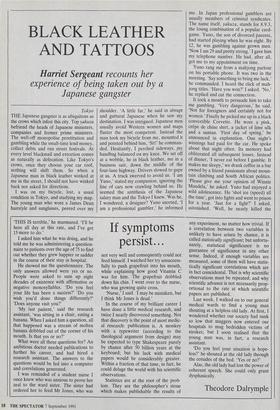If symptoms
persist...
'THIS IS terrible,' he murmured. 'I'll be here all day at this rate, and I've got 15,more to do.'
I asked him what he was doing, and he told me he was administering a question- naire to patients over the age of 75 to find out whether they grew happier or sadder in the course of their stay in hospital.
He showed me the questionnaire. The only answers allowed were yes or no. People were asked to sum up eight decades of existence with affirmative or negative monosyllables. 'Do you feel your life has been a success?' Do you wish you'd done things differently?' 'Does anyone visit you?'
'My last patient,' said the research assistant, 'was sitting in a chair, eating a banana. When I asked him a question, all that happened was a stream of molten banana dribbled out of the corner of his mouth. Is that yes or no?'
What were all these questions for? An ambitious doctor needed publications to further his career, and had hired a research assistant. The answers to the questions would be fed into a computer and correlations generated.
I was reminded of a student nurse I once knew who was anxious to prove her zeal to the ward sister. The sister had ordered her to feed Mr Jones, who was not very well and consequently could not feed himself. I watched her try unsuccess- fully to push grapefruit into his mouth, while explaining how good Vitamin C was for him. The grapefruit dribbled down his chin. I went over to the nurse, who was growing quite cross.
'Nurse,' I said. 'I may be mistaken, but I think Mr Jones is dead.'
In the course of my brilliant career I have done a little medical research, and twice I nearly discovered something. Not that discovery is the point of most medic- al research: publication is. A monkey with a typewriter (according to the theological argument from design) may be expected to type Shakespeare purely by chance after 50 billion years at the keyboard; but his luck with medical papers would be considerably greater. Within a fraction of that time, in fact, he could deluge the world with his scientific observations.
Statistics are at the root of the prob. lem. They are the philosopher's stone which makes publishable the results of any experiment, no matter how trivial. If a correlation between two variables is unlikely to have arisen by chance, it is called statistically significant; but unfortu- nately, statistical significance is no guarantee of significance in any other sense. Indeed, if enough variables are measured, some of them will have statis- tically significant correlations which are in fact coincidental. That is why scientific observations must be repeated; and why scientific advance is not necessarily prop- ortional to the rate at which scientific papers are published.
Last week, I walked on to our general medical wards to find a young man shouting at a helpless old lady. At first, I wondered whether our society had sunk so low that muggers now entered our hospitals to mug bedridden victims of strokes; but I soon realised that the young man was, in fact, a research assistant.
'Do you feel your situation is hope- less'?' he shouted at the old lady through the cotsides of the bed. 'Yes or no?'
Alas, the old lady had lost the power of coherent speech. She could only grunt dysphasically.
Theodore Dalrymple


















































 Previous page
Previous page